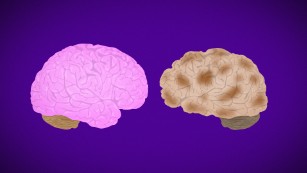"Based on previous research, we expected that pregnancy with childbirth may be associated with the risk of Alzheimer's disease," study author Dr. Ki Woong Kim, a neuropsychiatrist at Seoul National University, wrote in an email. "However we were quite surprised that incomplete pregnancy was associated with the lower risk of Alzheimer's, which we did not expect at the beginning of our research."
Alzheimer's is a progressive mental deterioration of the brain that destroys memory and thinking skills until the person is unable to do even the simplest of tasks. Irreversible once it begins, the disease is thought to be caused by a buildup in the brain of beta amyloid plaques and neurofibrillary tangles called tau.
The
2016 World Alzheimer Report says more than 47 million people around the world are living with dementia, more than the population of Spain. In the United States alone, 5.5 million are currently living with Alzheimer's; 3.4 million of them are women.
According to the Alzheimer's Association, women in their 60s are twice as likely to develop Alzheimer's as they are breast cancer.
Advancing age is the single greatest risk factor for Alzheimer's, and women typically live longer than men. But age is not the only factor.
Studies show that women tend to have more amyloid plaques than men of the same age and mental status; other
studies found that women with mild memory issues or who undergo
surgery with anesthesia decline faster than men. And a
Stanford studyfound that women who carry the ApoE-4 gene, a genetic risk factor, are twice as likely to develop Alzheimer's as women without ApoE-4. However, men carrying ApoE-4 have just a slightly elevated risk.
What is it about women that might increase their odds of developing dementia? An obvious target for research has been hormones and the role of pregnancy. Results have been mixed.
"In animals, early pregnancy was associated with improved cognition while late pregnancy and early postpartum with impaired cognition," Kim said. "In both animals and humans, estrogen is neuroprotective when it is modestly elevated while neurotoxic when extremely elevated."
Pregnancy is a hormonal roller coaster. During the first trimester, estrogen levels rise modestly, and then skyrocket for the rest of the pregnancy. By the third trimester, Kim said, estrogen levels can be "up to 40-fold higher" than their peak levels during natural menstrual cycles. Within four days of giving birth, estrogen levels for most women quickly drop to average levels.
At the same time, levels of progesterone and a stress hormone called cortisol increase rapidly during pregnancy but then plummet after the baby is born.
According to Kim, those imbalances might factor into the unusual results of his study.
"Because most incomplete pregnancies occur in the first trimester of pregnancy, it is possible that the modestly raised levels of estrogen in the first trimester of pregnancy are within the optimal range for reducing the risk of Alzheimer's disease," he said.
But too many births may do the opposite, Kim said, by continually exposing women to dramatically elevated levels of estrogen and stress hormones, followed by sudden withdrawals, thus reducing brain reserve.
"The findings are new and rather surprising," said Washington neurologist Dr. Pinky Agarwal, a fellow of the American Academy of Neurology who was not involved in the study. Previous studies have attributed the increased risk of Alzheimer's in women with five or more births to increased vascular risk factors, such as high blood pressure, obesity, high cholesterol and diabetes.
But this study adjusted for vascular risk, she said, while factoring in protective factors such as education -- higher education is known to provide cognitive reserve -- socioeconomic status and employment. The study also excluded women who had used hormone replacement therapy, had a hysterectomy or had an ovary removed, which might alter hormone levels.
However, she said, the use of oral birth control, which also affects hormone levels, was not considered.
Overall, Agarwal said, the study analyzed a possible contributing factor to the risk of Alzheimer's disease in women that deserves more study.
James Hendrix, who directs the global science initiatives for the Alzheimer's Association, agrees with the need for more research. He feels that it's premature to suggest hormones are the main culprit.
"There are other things that occur in pregnancy beyond a change in hormone levels," he said. "Things like changes in the immune system, a healthy or poor diet, the level of exercise and just the stress of parenting five or more children may have an impact. Cultural differences could also play a role, as does access to health care."
The underlying reason women are more susceptible to Alzheimer's is likely to be multiple things, Hendrix said, and science needs a better understanding of what those factors might be.
"The takeaway for women is that we need more research to understand why," he said. "Women just don't wake up one day and have Alzheimer's. Brain health is a life course, and we need to understand how our brains are impacted with what we do early in life and throughout our lives."




Comments
Post a Comment